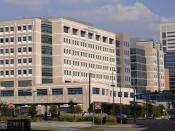Hereditary Colon Cancer Colon cancer is one of many cancers to plague United States citizens. There are four known types of colon cancer. Fourteen percent of all cancers diagnosed are colon cancer. Colon cancer is the third most commonly diagnosed cancer. Sporadic cancer accounts for 80 percent of all colon cancers and is considered non-hereditary. The remaining 20 percent of cancer are related to heredity. Familial Adenomatous Polyposis Coli (FAP) and Hereditary Non-Polyposis Colon Cancer (HNPCC) are hereditary colon cancers. There is another hereditary colon cancer, which is rare. This type of cancer only effects individuals are from Ashkenzi Jewish descent.
Hereditary colon cancer is passed from parents to their offspring through the genes. Hereditary colon cancer accounts for 21 percent of all colon cancers. Familial Adenomatous Polyposis Coli (FAP) is very rare and only accounts for one percent of all cases. If a person had FAP, they would develop hundreds or even thousands of colon polyps.
These polyps are developed at a very young age, Some people have been known to be as young as 13years of age. Most colon polyps are benign but some become cancerous. Most FAP patients develop cancer by the age of 39. Another form of hereditary cancer is Hereditary Non-Polyposis (HNPCC). HNPCC accounts for five to ten percent of all cases. HNPCC develops also at a young age but not as young as FAP patients. The actual cancer appears in the persons 40's. HNPCC is known as a "fast growing" form of cancer. Along with colon cancer HNPCC patients are also at a much higher risk for other forms of cancer.
Page 2 The causative factors of these cancers are not known at this time. Many doctors, scientists, and medical researchers believe individuals who fall into high-risk categories might be more apt to get...


